
-
Finde das richtige Futter für dein TierFülle den Fragebogen aus und finde das passende Futter für deine vierbeinigen LieblingFinde das richtige Futter für dein TierFülle den Fragebogen aus und finde das passende Futter für deine vierbeinigen LieblingZugehörige Produkte
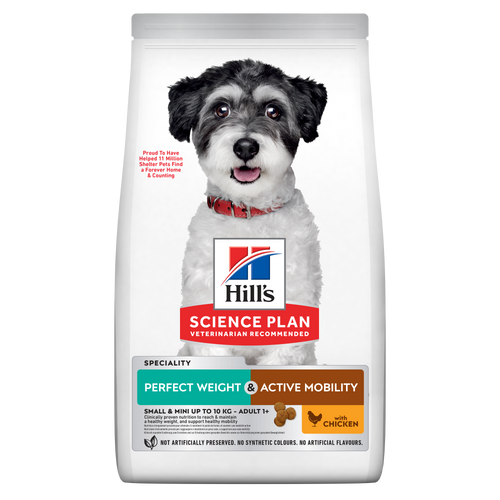 Perfect Weight + Active Mobility Hundefutter
Perfect Weight + Active Mobility HundefutterKlinisch erprobte Ernährung zum Erreichen und zur Erhaltung eines gesundes Gewichts sowie zur Unterstützung einer gesunden Beweglichkeit
Shop Now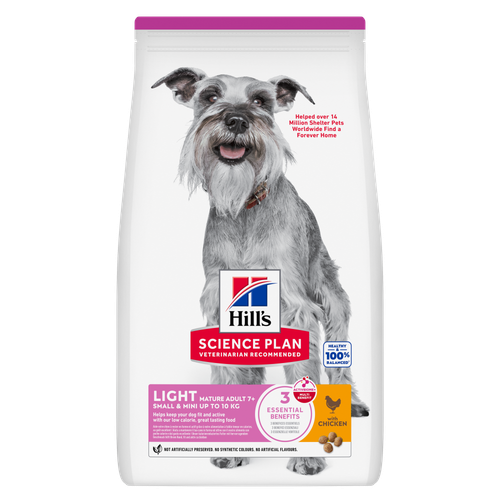 Light Small & Mini Mature Adult Hundefutter
Light Small & Mini Mature Adult HundefutterHill’s Science Plan Light Mature Adult Small & Mini Hundefutter mit Huhn ist ein Alleinfuttermittel, das speziell mit der ActivBiome+ Multi-Benefit-Technologie formuliert wurde.
Mit unserem kalorienarmen, wohlschmeckenden Futter bleibt dein Hund fit und aktiv.
Eine präzise Ernährung für weniger aktive ältere Hunde kleiner Rassen, die ein kalorienarmes Futter benötigen, das hilft, ein gesundes Gewicht zu halten.Shop Now Hypoallergenic Small & Mini Hundefutter
Hypoallergenic Small & Mini HundefutterHILL'S SCIENCE PLAN Hypoallergenic Small & Mini Adult Hundefutter mit Lachs ist ein Alleinfuttermittel für erwachsene Hunde kleiner Rassen im Alter von 1-6 Jahren. Es wurde entwickelt für Hunde mit empfindlicher Haut und empfindlichem Magen, mit einer begrenzten Anzahl an hochwertigen, neuartigen Proteinquellen und ohne Getreide.
Shop NowHäufige DiagnosenZugehörige Produkte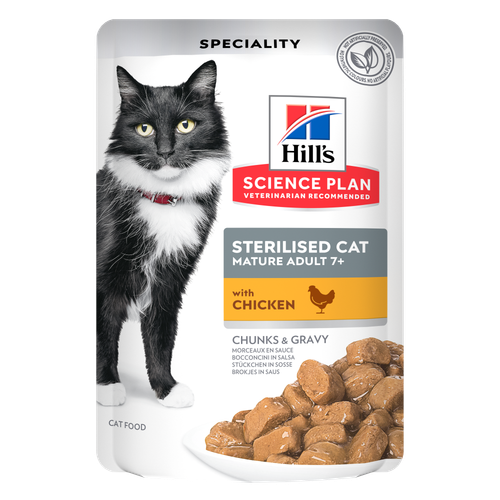 Sterilised Cat Mature Adult 7+ Nassfutter
Sterilised Cat Mature Adult 7+ NassfutterHill's Science Plan Sterilised Cat Mature Adult Nassfutter für Katzen mit Huhn ist ein Alleinfuttermittel für kastrierte Katzen ab einem Alter von 7 Jahren.
Shop Now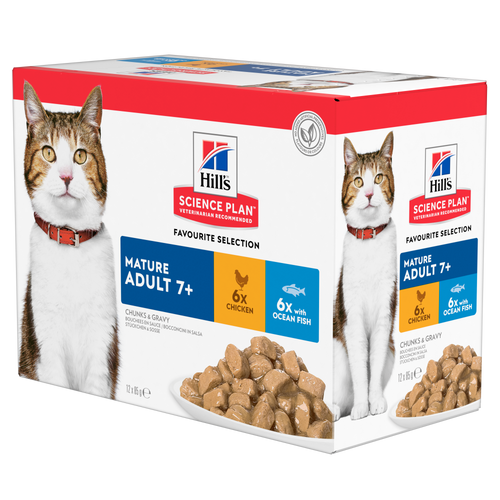 Mature Adult 7+ Multipack Nassfutter für Katzen
Mature Adult 7+ Multipack Nassfutter für KatzenZarte Stückchen in Soße für ältere Katzen. Hergestellt mit leicht verdaulichen Zutaten, hochwertigem Protein zur Erhaltung schlanker Muskeln sowie antioxidativem Vitamin C + E für optimale Gesundheit.
Shop Now Light Adult Katzenfutter mit Huhn
Light Adult Katzenfutter mit HuhnZarte Stückchen Huhn in Soße für Katzen, mit L-Carnitin und weniger Kalorien für ein optimales Gewichtsmanagement. Voll an hochwertigem Protein, Omega-6-Fettsäuren und Vitamin E für glänzendes Fell und gesunde Haut.
Shop Now -
Hund
- Tipps & Artikel zum Hund
-
Häufige Diagnosen Katze
- Gewicht
- Haut & Futtemittelempfindlichkeiten
- Harnwege
- Verdauung
- Gelenke
- Niere
- Genesung
- Zahnpflege
-
Lebensphasen - Hunde
- Ernährung von Welpen
- Ernährung von erwachsenen Hunden
- Ernährung von älteren Hunden
Katze- Tipps & Artikel zur Katze
-
Häufige Diagnosen Katze
- Gewicht
- Haut & Futtemittelempfindlichkeiten
- Harnwege
- Verdauung
- Niere
- Genesung
- Zahnpflege
- Stress
-
Lebensphasen - Katzen
- Ernährung von Kätzchen
- Ernährung von erwachsenen Katzen
- Ernährung von älteren Katzen
zugehörige Artikel Was Du über die Kalorien von Tierfutter wissen solltest
Was Du über die Kalorien von Tierfutter wissen solltestLerne festzustellen, wie viele Kalorien Dein Hund oder Deine Katze jeden Tag braucht, wie Du ihre Kalorien zählen kannst und was zu tun ist, wenn sie zu viele aufnehmen.
Read More Dürfen Hunde und Katzen Butter fressen?
Dürfen Hunde und Katzen Butter fressen?Erfahre alles darüber, ob Butter für Deinen Hund oder Deine Katze unbedenklich ist und was zu tun ist, wenn Dein Vierbeiner sie frisst.
Read More Ein Leitfaden für Haustierbesitzer:innen für sichere Wasserquellen für Haustiere
Ein Leitfaden für Haustierbesitzer:innen für sichere Wasserquellen für HaustiereStelle die Flüssigkeitszufuhr Deines Haustiers sicher, mit unserem Leitfaden für Haustierbesitzer:innen für sichere Wasserquellen für Haustiere. Für weitere Tipps zur Aufrechterhaltung der Gesundheit Deines Haustiers besuche Hill’s.
Read More -

 Wissenschaftlich basierte Ernährung macht den Unterschied, dem du vertrauen kannst
Wissenschaftlich basierte Ernährung macht den Unterschied, dem du vertrauen kannst
Chronische Nierenerkrankungen bei Hunden
Chronische Nierenerkrankungen bei Hunden
Was sind Nierenerkrankungen bei Hunden?
Eine chronische Nierenerkrankung (CNE) ist definiert als jede Anomalie einer oder beider Nieren, die bereits seit mehreren Monaten besteht. Eine CNE betrifft etwa 1 von 10 Hunden.1
Was trägt zu Nierenerkrankungen bei Hunden bei?
Es gibt zwei Hauptkategorien von Nierenerkrankungen bei Hunden: akute und chronische. Die Anzeichen einer akuten Nierenerkrankung treten in der Regel innerhalb einer Woche oder eines Monats auf, während eine chronische Nierenerkrankung als Nierenschaden definiert wird, der seit mindestens drei Monaten besteht. Häufige Ursachen für das Fortschreiten einer Nierenerkrankung sind:




Frühzeitige Erkennung von Nierenversagen bei deinem Hund
Anzeichen für eine ernsthafte Erkrankung treten erst auf, wenn bereits 75 % der Nierenfunktion verloren gegangen sind1. Je früher also eine Nierenerkrankung diagnostiziert wird, desto mehr Zeit bleibt, um die zugrunde liegende Ursache zu beheben oder das Fortschreiten der Krankheit zu verlangsamen. Eine CNE ist fortschreitend und unumkehrbar, aber deine Tierarztpraxis kann dich bei der Langzeitpflege unterstützen und dir zeigen, wie du die Anzeichen bei älteren Hunden erkennen kannst.
Was sind die Anzeichen einer Nierenerkrankung bei Hunden?
Die Anzeichen einer Nierenerkrankung im Frühstadium sind nicht sichtbar. Bei der Diagnose ist die CNE bereits seit einiger Zeit vorhanden, aber ihr Fortschreiten kann mit Hilfe von tierärztlich empfohlenen Hundefutter für Nierenerkrankungen verlangsamt werden. Die Anzeichen für eine Nierenerkrankung im Spätstadium sind in der Regel ähnlich, werden aber von den Tierbesitzer:innen viel deutlicher wahrgenommen.



















Futter für nierenkranke Hunde
Wenn dein Hund Nierenprobleme hat, kann sich die richtige Ernährung positiv auf seine Lebensqualität auswirken und möglicherweise sogar seine Lebenserwartung verbessern. Speziell formuliertes Futter für nierenkranke Hunde kann von Vorteil sein, da es weniger Eiweiß und Phosphor enthält als anderes Tierfutter. Eine Phosphorbeschränkung kann das Fortschreiten der Nierenschädigung verlangsamen, während kontrollierte, hochwertige Proteine die Schwere der Symptome lindern und zur Wiederherstellung eines normalen Säure-Basen-Haushalts beitragen können.
Nähre das Mikrobiom Deines Haustieres
Neue Erkenntnisse belegen einen Zusammenhang zwischen der Gesundheit des Darms und der Nierengesundheit.2
Eine Ernährung mit Inhaltsstoffen, die nachweislich das Darmmikrobiom nähren, kann dazu beitragen, Abfallprodukte, die für die Nieren schädlich sein können, zu reduzieren.
Was ist mit Nährhefe für nierenkranke Hunde?
Hefe hat zwar online an Popularität gewonnen, enthält aber relativ viel Phosphor, was für Hunde mit CNE problematisch sein könnte. Ebenso wird auf vielen Websites eine Rohfütterung für nierenkranke Hunde vorgeschlagen, ohne jedoch auf die zahlreichen Faktoren einzugehen, die dabei zu berücksichtigen sind, wie z. B. Kontaminationsrisiken, die richtige Nährstoffzusammensetzung und die Gesamtkosten. Bei der Suche nach Ernährungsoptionen für nierenkranke Hunde ist es immer am besten, eine spezifische Empfehlung von deiner Tierarztpraxis einzuholen.
Futter für nierenkranke Hunde
Wenn dein Hund Nierenprobleme hat, kann sich die richtige Ernährung positiv auf seine Lebensqualität auswirken und möglicherweise sogar seine Lebenserwartung verbessern. Speziell formuliertes Futter für nierenkranke Hunde kann von Vorteil sein, da es weniger Eiweiß und Phosphor enthält als anderes Tierfutter. Eine Phosphorbeschränkung kann das Fortschreiten der Nierenschädigung verlangsamen, während kontrollierte, hochwertige Proteine die Schwere der Symptome lindern und zur Wiederherstellung eines normalen Säure-Basen-Haushalts beitragen können.
Nähre das Mikrobiom Deines Haustieres
Neue Erkenntnisse belegen einen Zusammenhang zwischen der Gesundheit des Darms und der Nierengesundheit.2
Eine Ernährung mit Inhaltsstoffen, die nachweislich das Darmmikrobiom nähren, kann dazu beitragen, Abfallprodukte, die für die Nieren schädlich sein können, zu reduzieren.
Was ist mit Nährhefe für nierenkranke Hunde?
Hefe hat zwar online an Popularität gewonnen, enthält aber relativ viel Phosphor, was für Hunde mit CNE problematisch sein könnte. Ebenso wird auf vielen Websites eine Rohfütterung für nierenkranke Hunde vorgeschlagen, ohne jedoch auf die zahlreichen Faktoren einzugehen, die dabei zu berücksichtigen sind, wie z. B. Kontaminationsrisiken, die richtige Nährstoffzusammensetzung und die Gesamtkosten. Bei der Suche nach Ernährungsoptionen für nierenkranke Hunde ist es immer am besten, eine spezifische Empfehlung von deiner Tierarztpraxis einzuholen.
Mehr Produkte
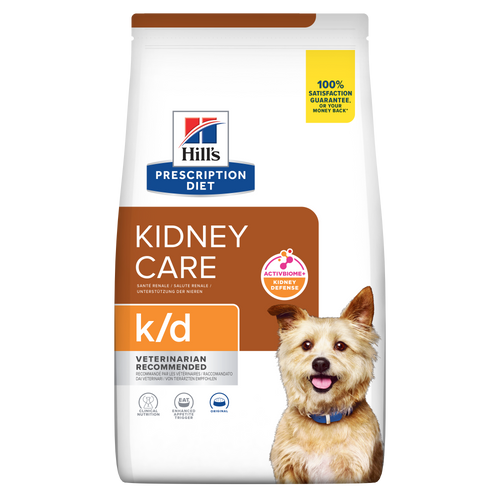
Köstliche, klinisch erprobte Ernährung, die eine längere und bessere Lebensqualität unterstützt
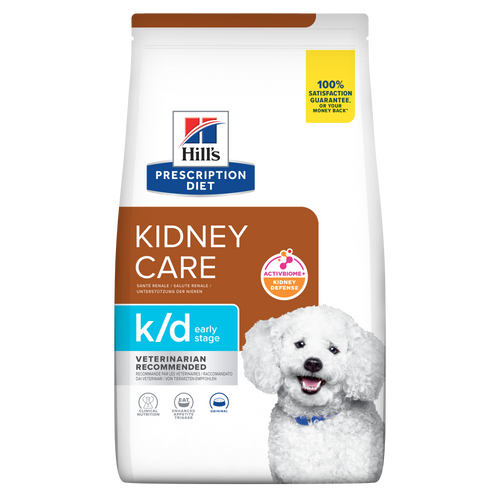
Ernährung, die klinisch erwiesen hilft, die lebenswichtige Nierenfunktion und die Gesundheit zu erhalten.
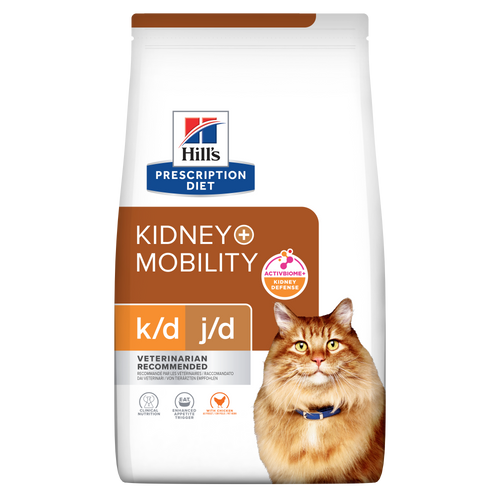
Köstliche klinische Ernährung, die hilft, die lebenswichtige Nierenfunktion zu schützen, den Appetit anzuregen sowie die Beweglichkeit und die Lebensqualität bei Katzen zu unterstützen
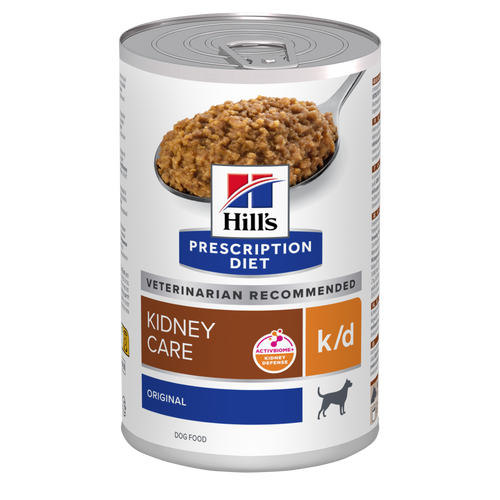
Köstliche, klinisch erprobte Ernährung, die eine längere und bessere Lebensqualität unterstützt
Verwandte Artikel

Erfahre, wie Giardien das Verdauungssystem deines Hundes beeinträchtigen können, wie eine Giardiasis diagnostiziert wird und wie die Tierarztpraxis deines Hundes dies behandeln kann.

Verstehe die möglichen Ursachen für übermäßigen Juckreiz bei Hunden und wie Du diese beseitigen kannst. Lass Dich von den Experten von Hill's beraten, um Deinem Hund zu helfen.
Entdecke die Ursachen, Anzeichen und Behandlungsmöglichkeiten von Nierenleiden bei Hunden und finde Methoden zur Unterstützung der Nierengesundheit Deines Hundes. Erfahre mehr bei Hill’s.

Das Leben eines Hundes ist nicht immer stressfrei. Die Stressfaktoren des Lebens können eine große Rolle für die Verdauung und die allgemeine Gesundheit Deines Hundes spielen. Erfahre mehr bei Hill's.
References: 1Lulich JP, Osborne CA, O’Brien TD, Polzin DJ. Feline renal failure: questions, answers, questions. Compend Contin Educ Pract Vet. 1992;14(2):127–153. Brown SA. Renal dysfunction in small animals. The Merck Veterinary Manual website.